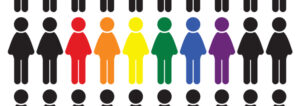Creating a positive culture for LGBT employees
- 4 Min Read
LGBT equality in the workplace has received increased attention in recent years, with one of the most visible signs being the ever-increasing sea of corporate logos and colleagues marching side by side during the annual Pride celebration.
- Author: Nick Barnett
- Date published: Feb 13, 2019
- Categories

 It’s encouraging to see, but the key question is how does this outward display of commitment translate into support for LGBT employees in the workplace every other day of the year?
It’s encouraging to see, but the key question is how does this outward display of commitment translate into support for LGBT employees in the workplace every other day of the year?
At Accenture, our commitment to LGBT equality is just as visible within the workplace. We have an ambition to be the most inclusive and diverse organisation in the world and have been on this journey since launching our first inclusion and diversity strategy back in the 90s. That strategy has been continually adapted and evolved, as we learn what works based on feedback from our employees and collaborate with partners such as Stonewall to share best practice.
What we have learned above all is that a culture of equality makes employees feel valued and motivated to perform at their best, without the constraints of having to hide any aspect of who they are. It’s backed up by our research which found that creating a culture of equality helps LGBT employees to thrive, making them 50 percent more likely to advance to manager or above, and three times more likely to advance to senior manager or above. In contrast, in organisations where these factors are less common, LGBT professionals are twice as likely to face discrimination or harassment.
So, what does a positive culture for LGBT employees actually look like? At Accenture, we talk about our commitment to fostering a diverse workforce both internally and externally; LGBT inclusivity is a core component of this and is something that we’ve actively cultivated over time.
One of its most visible elements is our LGBT allies programme. It’s based on our belief that to create a truly inclusive workplace, companies need to engage the majority of employees with the values and behaviours of inclusivity. Engaging our non-LGBT colleagues helps to foster support and enables colleagues to develop a deeper understanding of the challenges the LGBT community can still face. Something as simple as the rainbow striped lanyard our allies wear serves as a constant reminder of our inclusive culture, and the success of our UK LGBT allies programme has resulted in it being adopted at Accenture offices around the world.
Role models are another key element of our strategy, as we’ve found that storytelling is a powerful way of building support and getting employees to really think about each other’s different experiences and perspectives. Our LGBT role models are accessible points of contacts at all levels throughout the organisation – they can provide guidance and reassurance to anyone who needs it and help to ensure that a culture of equality infuses all aspects of life at Accenture.
Many organisations have made great progress on LGBT equality yet significant challenges remain, such as ensuring that trans and non-binary employees are effectively supported in the workplace. Last year Accenture updated its healthcare policy to enhance support for those employees who do not feel comfortable with the gender they were assigned at birth and want to explore gender-identity related procedures. We also use occasions such as Transgender Awareness Week and Transgender Day of Remembrance to take a deeper look at what it means to be transgender or gender non-conforming, and to learn what we can all do to become better trans allies.
It’s a continuous journey, and one that requires the commitment of employees beyond the LGBT community. Yet by taking responsibility for creating and sustaining an inclusive work environment, we all stand to benefit. An organisation where everyone – regardless of ethnicity, religion, gender, sexual orientation, age, or disability – feels equally accepted helps us all to perform at our best, and ultimately gives businesses a role in effecting positive change both within the workplace and broader society.









